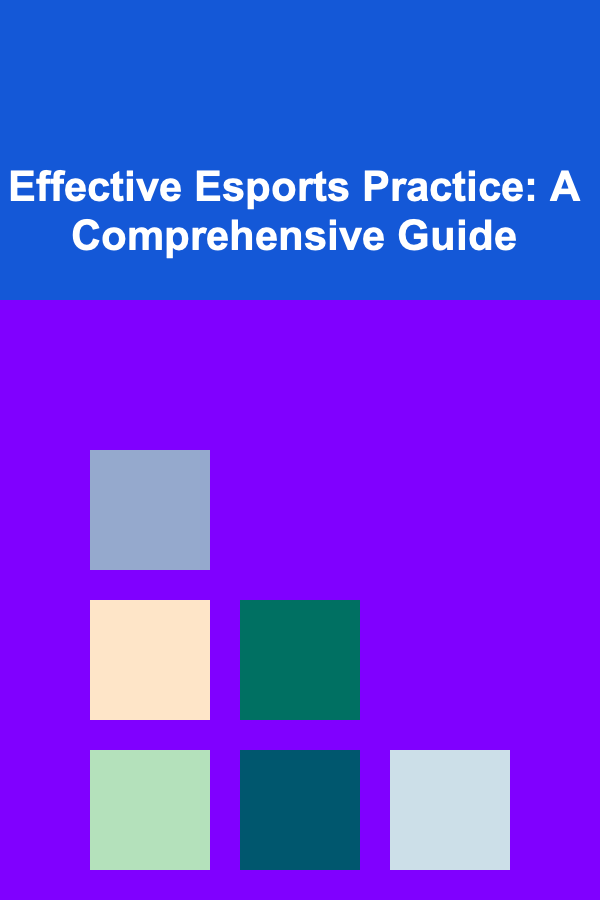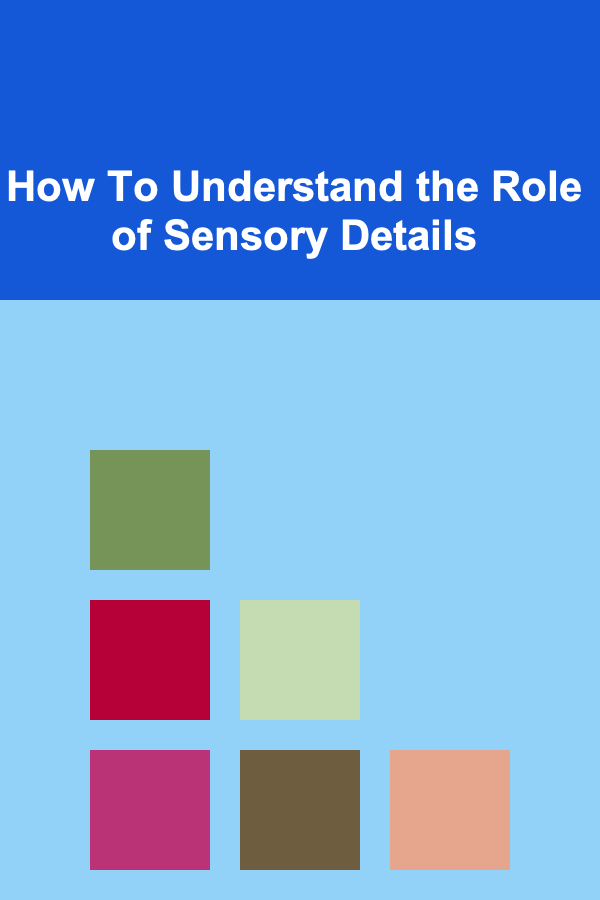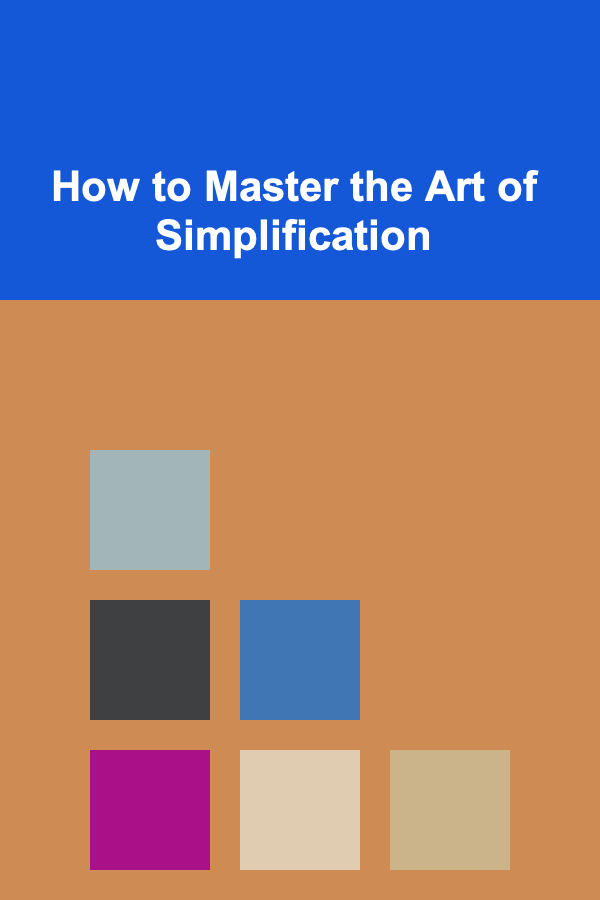
Effective Esports Practice: A Comprehensive Guide
ebook include PDF & Audio bundle (Micro Guide)
$12.99$9.99
Limited Time Offer! Order within the next:

The world of esports has exploded in popularity, transforming from a niche hobby into a multi-billion dollar industry. As the stakes rise, so does the level of competition. Raw talent alone is no longer sufficient to reach the top; dedicated, strategic practice is crucial. This guide delves into the multifaceted aspects of effective esports practice, providing a roadmap for aspiring and professional players alike to optimize their training and achieve peak performance.
Understanding the Foundations of Effective Practice
Before diving into specific practice techniques, it's essential to establish a solid understanding of the core principles that underpin effective skill development. These principles apply across all esports titles and form the bedrock of a successful training regimen.
Goal Setting and Performance Metrics
Effective practice starts with clear, measurable goals. Vague aspirations like "getting better" are insufficient. Instead, break down your overall goals into smaller, more manageable objectives. These objectives should be:
- Specific: Clearly define what you want to achieve (e.g., improve headshot accuracy with a specific weapon).
- Measurable: Establish quantifiable metrics to track your progress (e.g., increase headshot percentage from 30% to 40%).
- Achievable: Set realistic goals that are challenging but attainable within a given timeframe.
- Relevant: Ensure your goals align with your overall aspirations and the demands of your chosen esport.
- Time-bound: Define a specific timeframe for achieving each goal (e.g., improve headshot percentage by 1% per week).
Beyond setting goals, it's crucial to establish performance metrics that allow you to track your progress and identify areas for improvement. These metrics will vary depending on the game, but common examples include:
- Accuracy: Headshot percentage, shot accuracy, grenade placement accuracy.
- Efficiency: Actions per minute (APM), resources gathered per minute, damage dealt per minute.
- Reaction Time: Time to react to visual or auditory cues.
- Decision-Making: Win rate in specific scenarios, success rate of strategic plays.
- Consistency: Performance stability across multiple games and practice sessions.
Tools like in-game statistics, replay analysis software, and third-party performance tracking apps can be invaluable for gathering and analyzing these metrics.
The Importance of Deliberate Practice
Deliberate practice, a concept popularized by Anders Ericsson, is a highly focused and intentional approach to skill development. It differs significantly from casual gameplay or simply repeating actions without conscious effort. Key characteristics of deliberate practice include:
- Specific Goals: As mentioned earlier, deliberate practice is driven by clearly defined objectives.
- Focused Attention: It requires intense concentration and a conscious effort to identify and correct mistakes.
- Repetitive Drills: It involves repeating specific actions or scenarios multiple times to reinforce desired behaviors.
- Feedback and Reflection: It necessitates seeking and analyzing feedback to identify areas for improvement and adjust your approach.
- Stepping Outside Comfort Zone: It often involves tackling challenges that are slightly beyond your current skill level to stimulate growth.
Instead of simply playing matches repeatedly, a deliberate practice session might involve:
- Practicing specific aiming drills with a focus on precision and speed.
- Reviewing replays to identify mistakes in positioning or decision-making.
- Analyzing opponent tendencies to anticipate their strategies.
- Working with a coach to receive personalized feedback and guidance.
The Role of Mental Conditioning
Esports performance is not solely dependent on mechanical skill and strategic knowledge. Mental fortitude, resilience, and emotional regulation are equally crucial, especially in high-pressure situations. Mental conditioning techniques can help players develop these critical attributes:
- Visualization: Mentally rehearsing successful plays and outcomes to build confidence and improve performance.
- Mindfulness: Paying attention to the present moment without judgment to reduce stress and improve focus.
- Positive Self-Talk: Replacing negative thoughts with positive affirmations to boost self-esteem and motivation.
- Stress Management Techniques: Practicing relaxation techniques such as deep breathing or meditation to manage anxiety and improve composure.
- Goal Setting and Motivation: Setting realistic goals and developing strategies to maintain motivation and overcome obstacles.
Working with a sports psychologist or mental performance coach can provide valuable guidance and support in developing these mental skills.
Game-Specific Practice Strategies
While the foundational principles of effective practice apply across all esports titles, the specific techniques and strategies will vary depending on the game. This section explores some common game genres and provides examples of effective practice methods.
First-Person Shooters (FPS)
FPS games demand precise aiming, quick reflexes, strategic positioning, and effective teamwork. Effective practice in FPS titles often involves:
- Aim Training: Utilizing aim trainers like Aim Lab, KovaaK's, or in-game practice ranges to improve mouse control, target tracking, and flick aiming.
- Movement Drills: Practicing movement techniques such as strafing, bunny hopping, and peeking to improve agility and avoid enemy fire.
- Map Knowledge: Memorizing map layouts, spawn points, and strategic locations to gain a tactical advantage.
- Teamwork and Communication: Practicing communication and coordination with teammates to execute strategies and secure objectives.
- Scrimmages: Playing against other teams in a competitive environment to test strategies and improve teamwork.
- VOD Review: Watching replays of professional matches or your own gameplay to identify mistakes and learn new strategies.
Example: Instead of simply playing deathmatch, a dedicated aim training session might involve:
- Warming up with static target practice for 15 minutes.
- Switching to tracking targets for 15 minutes.
- Practicing flick shots for 15 minutes.
- Analyzing your performance and identifying areas for improvement.
Multiplayer Online Battle Arenas (MOBAs)
MOBAs require strategic thinking, resource management, teamwork, and a deep understanding of hero abilities and item builds. Effective practice in MOBAs often involves:
- Last Hitting and Farming: Practicing last hitting creeps to maximize gold income and gain an early advantage.
- Hero Mastery: Learning the strengths and weaknesses of specific heroes and mastering their abilities.
- Role Practice: Focusing on a specific role (e.g., carry, support, tank) and mastering the skills and strategies associated with that role.
- Map Awareness: Paying attention to the minimap and tracking enemy movements to anticipate ganks and make informed decisions.
- Item Builds: Experimenting with different item builds to optimize your hero's performance in various situations.
- Teamfight Simulations: Practicing teamfight scenarios to improve coordination and decision-making.
- Replay Analysis: Watching replays of professional matches or your own gameplay to identify mistakes in positioning, itemization, or decision-making.
Example: To improve map awareness, you might:
- Focus exclusively on the minimap for a portion of a practice game.
- Set alarms to remind yourself to check the minimap every few seconds.
- Analyze replays to identify instances where poor map awareness led to mistakes.
Real-Time Strategy (RTS) Games
RTS games demand quick thinking, efficient resource management, strategic planning, and the ability to adapt to changing circumstances. Effective practice in RTS games often involves:
- Build Order Optimization: Practicing specific build orders to maximize economic efficiency and gain an early advantage.
- Macro Management: Improving your ability to manage resources, build units, and expand your base.
- Micro Management: Honing your ability to control individual units and engage in tactical maneuvers.
- Scouting and Information Gathering: Developing strategies to scout enemy bases and gather information about their plans.
- Counter Strategies: Learning how to counter different enemy strategies and unit compositions.
- APM Training: Increasing your actions per minute (APM) to execute commands quickly and efficiently.
- Replay Analysis: Watching replays of professional matches or your own gameplay to identify inefficiencies in your build orders, macro management, or micro management.
Example: To improve macro management, you might:
- Set a goal for your resource income at a specific point in the game.
- Practice build orders that prioritize resource production.
- Analyze replays to identify instances where you were inefficient in managing your resources.
Fighting Games
Fighting games require precise execution, knowledge of frame data, strategic mind games, and the ability to anticipate opponent actions. Effective practice in fighting games often involves:
- Combo Practice: Mastering character-specific combos and practicing their execution in training mode.
- Frame Data Study: Learning the frame data of different moves to understand their properties and identify opportunities for punishes.
- Matchup Knowledge: Studying the strengths and weaknesses of different character matchups to develop effective strategies.
- Spacing and Movement: Practicing movement techniques such as footsies and zoning to control the space and create openings.
- Punishment Training: Learning how to punish specific opponent actions to capitalize on their mistakes.
- Mental Stack Management: Training your ability to manage multiple things at once (e.g., spacing, opponent tendencies, combo opportunities).
- Replay Analysis: Watching replays of professional matches or your own gameplay to identify mistakes in your execution, spacing, or decision-making.
Example: To improve your punishment game, you might:
- Identify common opponent actions that are punishable.
- Practice punishing those actions in training mode.
- Focus on punishing those actions in actual matches.
Structuring Your Practice Sessions
The structure of your practice sessions is just as important as the techniques you employ. A well-structured practice session will maximize your learning and ensure that you are making consistent progress.
Warm-up and Cool-down
Just like athletes in traditional sports, esports players should warm up before each practice session and cool down afterwards. A proper warm-up will prepare your body and mind for the demands of gameplay, while a cool-down will help you recover and prevent injuries.
A typical warm-up might include:
- Stretching exercises to improve flexibility and range of motion.
- Hand and wrist exercises to prevent strain.
- Light aim training or movement drills to sharpen reflexes.
- Mental preparation techniques such as visualization or mindfulness.
A typical cool-down might include:
- Stretching exercises to relax muscles.
- Light cardiovascular exercise to improve blood flow.
- Reviewing your practice session and identifying areas for improvement.
Practice Session Duration and Frequency
The optimal duration and frequency of practice sessions will vary depending on individual factors such as skill level, experience, and goals. However, some general guidelines can be followed:
- Consistency is key: Regular practice is more effective than sporadic marathon sessions.
- Avoid burnout: Overtraining can lead to fatigue, decreased performance, and even injuries.
- Listen to your body: Take breaks when you need them and don't push yourself too hard.
- Quality over quantity: Focus on deliberate practice and avoid simply grinding for hours without conscious effort.
A reasonable starting point might be 2-4 hours of practice per day, spread across multiple sessions. As you progress and become more accustomed to the demands of esports, you can gradually increase the duration and frequency of your practice sessions. It's also beneficial to vary the types of practice you engage in during each session (e.g., aim training, scrimmages, VOD review) to prevent boredom and maintain focus.
Balancing Game-Specific Practice with Fundamentals
While game-specific practice is essential for developing expertise in a particular title, it's also crucial to maintain a strong foundation of fundamental skills. This includes aspects like reaction time, hand-eye coordination, and strategic thinking. Neglecting these fundamentals can hinder your progress and limit your potential.
Allocate time each week to practice these fundamental skills. This might involve:
- Using general-purpose aim trainers to improve mouse control.
- Playing puzzle games to sharpen your cognitive skills.
- Reading strategy guides and analyzing professional gameplay to expand your knowledge.
The Importance of Rest and Recovery
Rest and recovery are just as important as practice for optimizing esports performance. Adequate sleep, proper nutrition, and stress management are essential for maintaining both physical and mental health.
- Sleep: Aim for 7-9 hours of sleep per night to allow your body and mind to recover.
- Nutrition: Eat a healthy and balanced diet to fuel your performance and support your overall well-being.
- Hydration: Drink plenty of water throughout the day to stay hydrated and maintain optimal cognitive function.
- Stress Management: Practice relaxation techniques such as deep breathing or meditation to manage stress and prevent burnout.
- Active Recovery: Incorporate light physical activity into your routine to improve blood flow and reduce muscle soreness.
Analyzing Your Performance and Adapting Your Strategy
Effective practice is an iterative process that involves constantly analyzing your performance, identifying areas for improvement, and adapting your training strategy accordingly. This requires a commitment to self-reflection, data analysis, and a willingness to experiment with new techniques.
Reviewing Replays and Identifying Mistakes
Replay analysis is a powerful tool for identifying mistakes in your gameplay and understanding why they occurred. Watch replays of both your own matches and professional matches to learn from your successes and failures.
When reviewing replays, pay attention to:
- Positioning: Were you in the optimal position to engage in combat or secure objectives?
- Decision-Making: Did you make the right choices in terms of strategy, itemization, or ability usage?
- Execution: Did you execute your plans effectively, or were there errors in your aim, movement, or timing?
- Communication: Was your communication clear and effective, or were there misunderstandings or missed opportunities?
Take notes on your observations and use them to inform your future practice sessions.
Seeking Feedback from Coaches or Experienced Players
Feedback from coaches or experienced players can provide valuable insights that you might not be able to identify on your own. Seek out mentors or coaches who can provide constructive criticism and guidance.
When seeking feedback, be open to criticism and willing to learn from your mistakes. Ask specific questions and provide context for your actions to help your coach or mentor understand your thought process.
Experimenting with New Techniques and Strategies
The esports landscape is constantly evolving, with new techniques and strategies emerging all the time. Be willing to experiment with new approaches to see if they can improve your performance.
This might involve:
- Trying out new hero builds or unit compositions.
- Learning new movement techniques or aiming drills.
- Adopting new communication strategies or team formations.
Don't be afraid to step outside of your comfort zone and try something new. Even if it doesn't work out, you will still learn something valuable.
Tracking Your Progress and Adjusting Your Goals
Regularly track your progress towards your goals and adjust them as needed. If you are consistently exceeding your goals, it might be time to set more challenging objectives. If you are struggling to meet your goals, it might be necessary to adjust your approach or seek additional support.
Maintaining a practice journal can be a helpful way to track your progress and identify patterns in your performance. Record your practice sessions, your observations, and your goals, and use this information to make informed decisions about your training strategy.
Overcoming Common Practice Challenges
Even with the best intentions and a well-structured plan, you will inevitably encounter challenges along the way. Recognizing and addressing these challenges is crucial for maintaining momentum and achieving your goals.
Motivation and Burnout
Maintaining motivation over the long term can be difficult, especially when progress is slow or setbacks occur. Burnout is a common problem among esports players, and it can have a significant impact on performance.
To maintain motivation and prevent burnout:
- Set realistic goals and celebrate your successes along the way.
- Take regular breaks and avoid overtraining.
- Find ways to make practice more enjoyable, such as playing with friends or listening to music.
- Remember why you are pursuing esports and connect with your passion for the game.
Plateaus and Stagnation
It's common to experience plateaus in your progress, where you feel like you are no longer improving. This can be frustrating, but it's important to remember that it's a natural part of the learning process.
To overcome plateaus:
- Identify the specific areas where you are struggling.
- Seek feedback from coaches or experienced players.
- Experiment with new techniques and strategies.
- Focus on improving your fundamentals.
- Be patient and persistent.
Tilt and Emotional Control
Tilt, or becoming emotionally upset or frustrated during gameplay, can significantly impair your performance. Learning to control your emotions and maintain a positive mindset is crucial for success in esports.
To manage tilt:
- Recognize the signs of tilt and take steps to calm yourself down.
- Practice stress management techniques such as deep breathing or meditation.
- Focus on the process rather than the outcome.
- Remember that everyone makes mistakes.
- Take a break from the game if you are feeling overwhelmed.
Conclusion: The Path to Esports Excellence
Effective esports practice is a multifaceted process that requires dedication, discipline, and a willingness to learn and adapt. By understanding the foundational principles of effective practice, employing game-specific strategies, structuring your practice sessions effectively, analyzing your performance, and overcoming common challenges, you can significantly improve your skills and increase your chances of success in the competitive esports arena. Remember that the journey to esports excellence is a marathon, not a sprint. Stay focused on your goals, be persistent in your efforts, and enjoy the process of continuous improvement.

How to Keep Track of Volunteer Hours Efficiently
Read More
How to Soundproof Your Home for Better Podcasting or Streaming
Read More
How to Use Real Estate as a Long-Term Investment Strategy
Read More
How To Understand the Role of Sensory Details
Read More
How to Master the Art of Simplification
Read More
10 Tips for Troubleshooting Common Cheese Making Problems
Read MoreOther Products

How to Keep Track of Volunteer Hours Efficiently
Read More
How to Soundproof Your Home for Better Podcasting or Streaming
Read More
How to Use Real Estate as a Long-Term Investment Strategy
Read More
How To Understand the Role of Sensory Details
Read More
How to Master the Art of Simplification
Read More